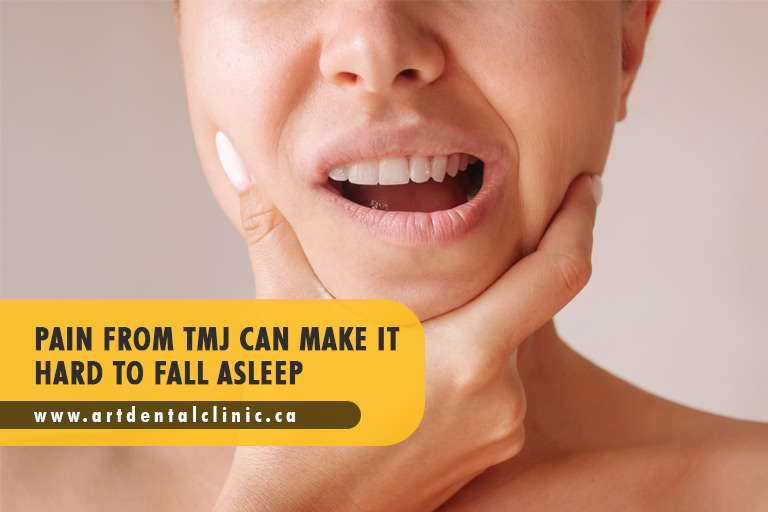Adequate sleep is fundamental for our general health and everyday performance. Nevertheless, the connection between oral health and sleep quality is often underestimated. The state of your mouth, teeth, and gums can exert a substantial influence on the quality of your sleep.
Find out how bad teeth can cause sleep problems and discover helpful tips for enhancing both your oral well-being and overall health.
4 Oral Health Issues That Impact Sleep
Let’s learn more about how oral health affects sleep by examining these common dental issues that cause sleep disruptions:
1. Bruxism
Bruxism, commonly known as teeth grinding or clenching, is a widespread oral health issue that can seriously disrupt your sleep. Many people who suffer from bruxism are unaware of it, as it often occurs during sleep. The grinding or clenching of teeth can produce a range of problems that influence sleep quality, including:
- Disrupted Sleep Patterns
Bruxism can lead to frequent awakenings during the night, disrupting your sleep cycle and preventing you from reaching deep, restorative sleep stages. - Facial Pain and Tension
The excessive pressure applied to your jaw and facial muscles during teeth grinding can result in pain and tension, which can make it difficult to relax and fall asleep. - Headaches
Bruxism is a common cause of morning headaches. The tension created in your jaw and face during grinding can trigger headaches, making it harder to wake up feeling refreshed. - Dental Damage
Bruxism can lead to tooth damage, such as chipped or cracked teeth, which can be painful and further impact your ability to sleep peacefully.
Addressing bruxism is essential for improving sleep quality. Dentists can recommend treatments like wearing a mouth guard at night to protect your teeth and alleviate the strain on your jaw.
2. TMJ

Temporomandibular joint disorder (TMJ) is a condition affecting the jaw joint and the surrounding muscles. TMJ disorder can lead to various symptoms that interfere with sleep, such as:
- Pain and Discomfort
Individuals with TMJ disorder often experience pain in their jaw, face, neck, and even shoulders. It may be difficult to find a sleeping posture that is comfortable with this pain. - Jaw Popping or Clicking
Many people with TMJ disorder experience jaw popping or clicking, which can be distracting and disruptive to both falling asleep and staying asleep. - Bruxism
TMJ disorder and bruxism frequently overlap. The discomfort caused by TMJ issues can lead to increased teeth grinding and clenching during sleep, exacerbating the problems associated with both conditions. - Sleep Apnea
In some cases, TMJ disorder can be linked to sleep apnea. For instance, when an individual has issues like an overbite, underbite, or crossbite, it can result in an unhealthy resting position of the jaw, potentially causing both TMJ discomfort and airway obstruction, thereby leading to sleep apnea. Conversely, there are occasions when sleep apnea can lead to the development of TMJ issues.
To manage TMJ disorder and improve sleep quality, individuals can consult with a dentist or TMJ specialist who can recommend various treatments, including dental splints, physical therapy, or, in severe cases, surgery.
3.Dry Mouth
Dry mouth, or xerostomia, is a condition in which your salivary glands do not produce enough saliva to moisten your mouth. It can result from various factors, including medications, medical conditions, or simply dehydration. Dry mouth can lead to:
- Difficulty Swallowing and Speaking
A dry mouth can make it uncomfortable to swallow and speak, which can disrupt your sleep if you wake up due to these sensations. - Increased Risk of Dental Problems
Saliva is essential in keeping your teeth healthy. A dry mouth can lead to an increased risk of dental issues, such as cavities, which can be painful and affect sleep. - Bad Breath
A dry mouth often leads to bad breath, which can be a source of discomfort and anxiety when trying to sleep.
To alleviate the symptoms of dry mouth and improve sleep quality, individuals should hydrate adequately, maintain good oral hygiene, and consider using saliva-inducing products, such as sugar-free gum or lozenges.
4. Gum Disease
Gum disease, also known as periodontitis, is an inflammation of the gum tissues that can lead to tooth loss if left untreated. The connection between gum disease and sleep quality may not be immediately obvious, but it is significant due to the following factors:
- Pain and Discomfort
Gum disease can cause gum swelling, tenderness, and pain, making it challenging to find a comfortable sleeping position. - Bad Breath
Persistent bad breath, a common symptom of gum disease, can be embarrassing and disrupt sleep, particularly if it leads to anxiety or self-consciousness. - Systemic Inflammation
Gum disease is linked with systemic inflammation, which can contribute to various health problems. Additionally, inflammation may disrupt sleep patterns, leading to restlessness.
Enhancing the quality of your sleep and managing gum disease necessitates the importance of seeking out professional dental care. Regular dental check-ups and a consistent oral hygiene routine play a crucial role in the prevention and treatment of gum disease.
10 Helpful Tips to Improve Your Dental Health

Improving your oral health can significantly enhance your sleep quality. Here are some tips to help you maintain good oral hygiene and, in turn, enjoy better sleep:
1. Brush and Floss Regularly
Brush your teeth at least twice a day and floss daily to remove plaque and prevent gum disease and tooth decay.
2. Use a Mouthwash
An antimicrobial mouthwash can help kill bacteria in your mouth, promoting better oral health.
3. Stay Hydrated
Drinking enough water is essential for saliva production and preventing dry mouth.
4. Limit Caffeine and Alcohol
These drinks can dehydrate you and interfere with sleep. Consume them in moderation, especially in the evening.
5. Avoid Sugary and Acidic Foods
Acidic and sugary foods can cause tooth decay. Try to limit your consumption of these foods, especially before bedtime.
6. Manage Stress
Stress is a significant contributor to bruxism and other oral health issues. Engage in stress-reduction techniques like meditation, yoga, or deep breathing exercises.
7. Get Regular Dental Check-Ups
Regular visits to the dentist can help identify and address oral health issues early, preventing them from interfering with your sleep.
8. Invest in a Quality Pillow
If you suffer from TMJ or bruxism, consider using a memory foam or orthopedic pillow to support your head and neck while sleeping.
9. Maintain a Consistent Sleep Schedule
Going to bed and waking up at the same time every day can help regulate your sleep cycle and improve overall sleep quality.
10. Seek Professional Help
If you suspect that you have a severe oral health issue, consult a dentist or specialist for diagnosis and treatment.
Maintaining optimal oral health is of paramount importance for a beautiful smile and overall physical well-being, playing a crucial role in ensuring a peaceful night’s sleep. The connection between oral health and insomnia becomes evident when we consider conditions such as bruxism, TMJ issues, dry mouth, and gum disease, all of which have the potential to introduce pain and discomfort that interfere with peaceful sleep. By following the helpful tips provided, you can take control of your oral health and, in turn, significantly improve your sleep quality. Remember, a good night’s sleep starts with a healthy mouth, so don’t neglect your oral hygiene, and consult with a dentist in Waterloo for any persistent issues that affect your sleep. Contact Art Dental Clinic at (519) 747-9797 to help you maintain a healthy mouth.

